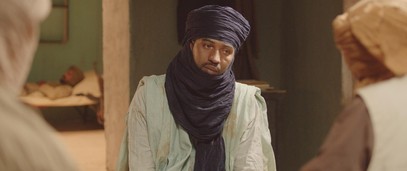




Not far from Timbuktu, now ruled by the religious fundamentalists, Kidane lives peacefully in the dunes with his wife Satima, his daughter Toya, and Issan, their twelve-year-old shepherd.
In town, the people suffer, powerless, from the regime of terror imposed by the Jihadists determined to control their faith. Music, laughter, cigarettes, even soccer have been banned. The women have become shadows but resist with dignity. Every day, the new improvised courts issue tragic and absurd sentences. Kidane and his family are being spared the chaos that prevails in Timbuktu.
But their destiny changes when Kidane accidentally kills Amadou, the fisherman who slaughtered «GPS», his beloved cow. He now has to face the new laws of the foreign occupants.
On July 29th, 2012 in Aguelhok, a small city in northern Mali – more than half of which was being occupied by men who were mostly outsiders – an unspeakable crime took place to which the media largely turned a blind eye. A thirty-something couple, blessed with two children, were stoned to death.
Their crime: they weren’t married. The video of their killing, which was posted online by the perpetrators, is horrid. The woman dies struck by the first stone, while the man lets out a hollow rasp of a cry. Then silence. Soon after they were dug up only to be buried further away. Aguelhok is not Damascus, nor Tehran. So nothing is said about all this. What I write is unbearable, I know this. I am in no way trying to use shock value to promote a film. I can’t say I didn’t know and, now that I do, I must testify in the hopes that no child will ever again have to learn their parents died because they loved each other.